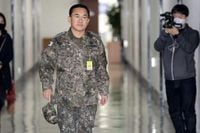South Korea is currently grappling with a high-profile investigation involving the Ministry of National Defense (MND) and its alleged creation of a so-called "blacklist" targeting military personnel. The Corruption Investigation Office for High-ranking Officials (CIO) has uncovered documents suggesting that the MND, under the leadership of former Defense Minister Yeo In-hyung, compiled detailed records on the political affiliations and relationships of active and reserve military generals. This investigation has intensified amid concerns about potential abuses of power and interference in military personnel decisions.
The controversy centers on a list compiled by the Defense Counterintelligence Command (DCC), a unit within the MND, which reportedly includes names of military judges, prosecutors, and generals who were identified as being affiliated with former lawmaker Choi Kang-wook. The so-called "Choi Kang-wook line" list, discovered during a January 2025 raid on the MND, includes around 30 military legal officers and judges who had contact with Choi between 2017 and 2020. Notably, many on this list are non-military academy graduates, a detail that has raised eyebrows given the traditionally dominant role of military academy alumni in South Korea’s armed forces.
Former lawmaker Choi Kang-wook served as the secretary for public service discipline at the Blue House during the Moon Jae-in administration from September 2018 to March 2020. In this role, he was responsible for vetting public officials, including military personnel. The Defense Counterintelligence Command reportedly viewed Choi as having excluded military academy graduates from key military positions and believed he relayed information about misconduct among these officers to the presidential office. Choi has denied these claims, stating, "I do not know Kim Sang-hwan well, and I have no acquaintance with Seo Seong-hoon. I never met or had gatherings with military legal officers between 2017 and 2020." He added, "Screening out military academy graduates is not possible through the military's promotion recommendation committee, and excluding non-military academy generals is the duty of the anti-corruption secretariat. The intelligence capability of the Defense Counterintelligence Command seems limited."
The investigation also scrutinizes the timing and motivations behind the blacklist’s creation. The documents indicate that the list began to take shape after Yeo In-hyung assumed command of the Defense Counterintelligence Command in November 2023. The CIO has obtained statements from MND personnel indicating that Yeo instructed subordinates to research the "Choi Kang-wook line" and to consider plans for the transfer of Kim Sang-hwan, the head of the Army Legal Affairs Office. Yeo himself, a graduate of the 48th class of the Korea Military Academy and a contemporary of former President Yoon Suk-yeol and former Defense Minister Kim Yong-hyun, is now a suspect in the investigation, facing allegations of abuse of power related to these activities. He is currently detained and undergoing trial for charges connected to the December 3 emergency martial law incident.
Further complicating the investigation is the discovery that the Defense Counterintelligence Command also compiled extensive personal data and political profiles on current and former generals across the Army, Navy, and Air Force, as well as reserve officers expected to be appointed to key positions within the Ministry of National Defense and its subordinate agencies. These profiles reportedly included assessments of their political leanings and proximity to the Democratic Party, raising serious concerns about political discrimination and unlawful surveillance within the military hierarchy.
In late May 2025, the CIO intensified its investigation by conducting a second raid on the Defense Counterintelligence Command’s facilities. During this operation, the CIO seized documents related to general officer promotions, appointments, intelligence reports, and reviews of reserve general officers’ personnel plans. The CIO suspects that former Defense Minister Kim Yong-hyun, who served as chief of the Presidential Security Service during President Yoon’s administration, was regularly briefed on the blacklist documents. There is also ongoing scrutiny into whether former President Yoon Suk-yeol himself received reports concerning these internal documents.
The CIO’s Emergency Martial Law Task Force is probing whether the creation and use of the blacklist were linked to plans for a potential state of emergency. Under such circumstances, military courts would assume jurisdiction over major cases, making control over military judicial personnel and prosecutors a strategic priority. This theory is supported by suspicions that the Defense Counterintelligence Command sought to dominate military judicial and investigative bodies, possibly as part of a broader effort to consolidate power during an emergency.
Multiple Defense Counterintelligence Command officials have reportedly confirmed that the blacklist was actively managed and that documents influencing military personnel decisions were produced following Yeo In-hyung’s appointment. The CIO has labeled these actions as potential abuses of authority and has expanded its investigation accordingly. An MND official told reporters, "We are actively cooperating with the investigation," signaling a willingness to assist in uncovering the full extent of the alleged misconduct.
The implications of the investigation are far-reaching. If proven, the use of blacklists and political profiling within the military could undermine the integrity of South Korea’s armed forces, which have long prided themselves on professionalism and apolitical service. The case also raises questions about civilian oversight of the military and the potential for politicization within national defense institutions.
As the CIO continues its forensic analysis of seized materials, it plans to summon and interrogate key figures, including former Defense Minister Yeo In-hyung. The office is also considering additional charges beyond abuse of power if further evidence reveals broader misuse of authority or other criminal conduct.
For now, the South Korean public watches closely as the investigation unfolds, with many awaiting clarity on how deep the alleged infiltration of politics into the military runs, and what consequences will follow for those implicated. The case serves as a potent reminder of the delicate balance between military authority and democratic governance, especially in a country where national security remains paramount.

